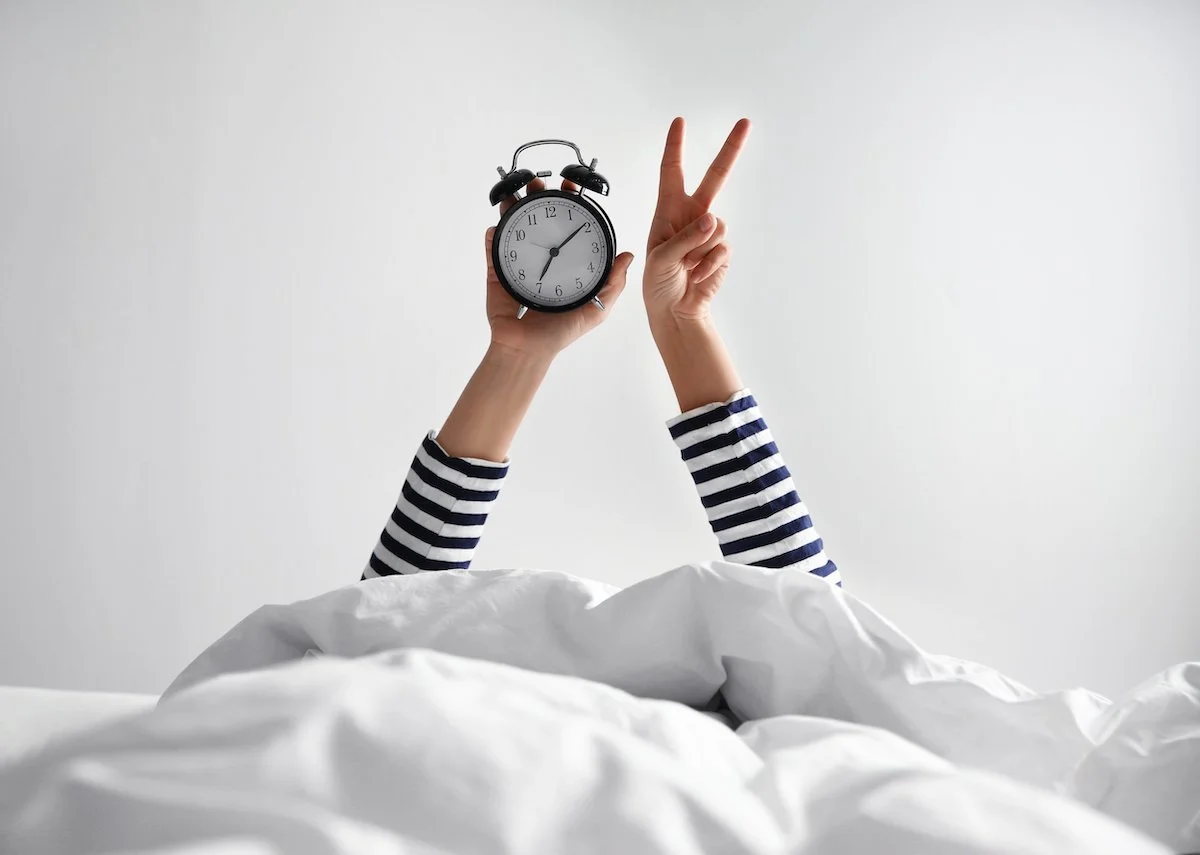Why You Should Embrace a Consistent Wake-Up Time and Ditch a Set Bedtime to Improve Sleep
By: Kelly Murray, Certified Adult Sleep Coach, FDN-P
I want to set the record straight on some sleep advice that is often given but can be confusing and misleading. Specifically, the idea that you should go to bed and wake up at the same time every day.
While half of this advice holds true, I strongly recommend focusing on a consistent wake-up time, rather than a set bedtime. Let me explain why…
Understanding Sleep Pressure and Adenosine
Our sleep is regulated by two systems:
circadian rhythm
&
sleep pressure
You're probably familiar with the circadian rhythm, which involves the ebb and flow of cortisol (the alert hormone) and melatonin (the sleepy hormone). However, you may not be as familiar with the concept of sleep pressure.
Sleep pressure is built up as we stay awake, and it involves the release of a chemical called adenosine. Adenosine inhibits brain function and makes us feel sleepy. As adenosine levels increase throughout the day, our brain activity decreases, and we become increasingly tired. Conversely, during sleep, adenosine levels decrease. This means that the longer you're awake, the more adenosine builds up in your system, making you sleepier and more likely to fall asleep easily and stay asleep.
However, adenosine levels are also influenced by various factors such as your daily mental and physical activities. Some days you may have higher mental or physical loads, while other days may be less demanding. This variation causes your adenosine levels to fluctuate. Depending on your activity level, you may feel ready for bed between 9:30 and 10:00 on some nights, while other nights you may have more energy and not be ready to sleep until 10:30.
If you try to adhere to a strict bedtime, it can lead to sleep anxiety. Sleep anxiety occurs when you become nervous about your ability to sleep well. For individuals who already struggle with sleep, this anxiety can trigger the fight-or-flight response, leading to increased cortisol production instead of melatonin. We want cortisol levels to be low at night and melatonin levels to be high for optimal sleep.
Listening to Your Body
To avoid this scenario, I recommend listening to your body instead of sticking to a strict bedtime. Pay attention to when you feel sleepy and jump into bed at that time, especially if you have trouble falling asleep or staying asleep. There's a difference between feeling tired and feeling sleepy. Tiredness is feeling worn out, while sleepiness is when you feel the strong urge to sleep and can't keep your eyes open.
The Importance of a Consistent Wake-Up Time
On the other hand, I do encourage you to follow half of the advice commonly given, which is to wake up at the same time every day, even on weekends. Your wake-up time plays a crucial role in setting your circadian rhythm. When you wake up and expose your eyes to light, it signals your body to release cortisol, giving you energy for the day. As the day progresses, cortisol levels naturally decline, reaching their lowest point at night. Additionally, exposure to light in the morning triggers the production of melatonin approximately 13 hours later. By maintaining a consistent wake-up time, you avoid constant shifts in your hormone levels.
One common mistake I see people make is sleeping in on weekends to make up for lost sleep during the week.
While it may seem tempting, this habit disrupts your circadian rhythm, making it harder for your body to adjust back to the usual sleep schedule. This can lead to sleep anxiety and starting the week off feeling overtired.
Practical Tips for Consistent Wake-Up Time
Similarly, after a bad night of sleep, resist the urge to sleep in. Doing so will further shift your circadian rhythm and disrupt your melatonin levels, potentially causing even more poor sleep.
1. Set an Alarm
Set an alarm for the same time every day, including weekends, to support a strong circadian rhythm.
2. Go outdoors
Make it a habit to spend 10 to 20 minutes outdoors without sunglasses every morning to expose your eyes to natural light and stimulate cortisol release.
Give It At Least Two Weeks
I encourage you to give this approach a try for the next two weeks, and I'm confident you'll see a significant improvement in the quality of your sleep.
If you don't experience the desired changes, it may indicate underlying physical dysfunction that contributes to your sleep issues. In such cases, I highly recommend considering functional lab testing to identify any mineral deficiencies or neurotransmitter imbalances that may be impacting your sleep.
By addressing these underlying issues, we can improve not only your sleep but also your overall health. To learn more about working with me one-on-one, please schedule a free 30-minute discovery call with me →
Sweet Dreams
Kelly Murray is a certified adult sleep coach and an award-winning pediatric sleep consultant based in Chicago offering sleep coaching services nationwide.






